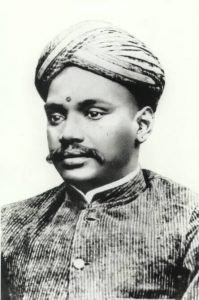On 18 November 1936, formidable freedom fighter and entrepreneur V.O. Chidambaram Pillai, better known as ‘V O C’ passed away in Thoothukudi, Tamil Nadu. This article will give a short biography of VOC Pillai within the context of the IAS Exam.
| Be sure to visit the 100 Difference Between Articles for UPSC Revision page now for a thorough UPSC preparation!!
To complement your preparation in the History segment of the UPSC exams, check the following links:
|
VOC Pillai Biography
- Valliappan Olaganathan Chidambaram Pillai was born on 5 September 1872 to Olaganathan Pillai and Paramyee
 Ammai in Ottapidaram, District Tirunelveli in modern Tamil Nadu.
Ammai in Ottapidaram, District Tirunelveli in modern Tamil Nadu. - He graduated from Caldwell College in Tuticorin (former name of Thoothukudi) before working as a Taluk office clerk. In 1894, he went to Tiruchirappalli to pursue law. After that, he became a pleader in 1895 practising in his birthplace Ottapidaram.
- V.O.C met Ramakrishnanathar, a saint of the order of the Ramakrishna Mission and was deeply influenced by him to work for the nation. He was also close friends with the great poet Subramanya Bharathi with whom he shared political ideologies.
- V.O.C’s entry into politics happened in 1905 when he joined the Congress Party after the Bengal partition. He was a follower of Bal Gangadhar Tilak. He was also a great believer in the Swadeshi movement.
- Tuticorin was a business centre and the merchants there did a lot of business with Sri Lanka. At that time, shipping, both passenger as well as cargo, was entirely controlled by European shipping companies. The British Indian Steam Navigation Company Ltd., the only shipping business that had a regular steamer service between Tuticorin and Colombo was infamous for its shoddy treatment of its Indian patrons.
- In 1906, V.O.C decided to establish an Indian shipping company called the Swadeshi Steam Navigation Company. The company was founded on 16 October 1906, largely due to the efforts of V.O.C with support from his merchant-friends. This was a hit for the British company which began to take reactive steps.
- Along with a fiery speaker Subramania Siva, V.O.C started the ‘Swadeshi Sangam’.
VOC – Role in the Indian Freedom Struggle
- A turning point in V.O.C’s life came with the Tuticorin Coral Mills strike in 1908. The workers at the British-owned mill were unfairly treated. 59% of the workers were aged 14 – 16. They had to work from 5:00 am to 7:00 pm. In February 1908, they decided to go on a strike demanding better pay and a reduction in the number of working hours.
- V.O.C took up the workers’ cause and gave many fiery speeches which drew the people’s attention to the plight of the workers. The cause gained widespread sympathy and support.
- V.O.C, Siva and Padmanabha Iyengar decided to hold a procession on 9 March 1908 to observe the release of national leader Bipin Chandra Pal from prison. They also wanted to unfold the Swaraj flag.
- Tuticorin Collector Wynch warned the Madras government and informed them of the prominence and danger of the national leaders in Tuticorin. He wanted to stop the procession from taking place. On 12 March 1908, the three leaders including V.O.V, Siva and Iyengar were remanded to the district jail.
- There was widespread condemnation in Tuticorin of the arrest and the people reacted violently.
- The court sentenced V.O.C to two life imprisonments for charges of sedition.
- An appeal to the Madras High Court reduced the sentence to 6 years in prison and 4 years in transportation both to run concurrently.
- V.O.C and Siva had to undergo rigorous imprisonment. V.O.C was subject to hard labour in prison and his health suffered a great deal. For instance, he was put in place of an ox and made to draw an oil press in the hot sun. His sentence was reduced and he was released in December 1912.
Later Life
- After he was released, he had to move to Chennai with his family since he was not permitted to return to Tirunelveli. His license to practice law was cancelled and he had to run a provisions store to feed his family. His steamer company had been liquidated and the assets sold to the rival company.
- V.O.C was in regular correspondence with Mahatma Gandhi but he later cited ideological differences with Gandhi as the reason for withdrawing from the Congress Party in 1920.
- V.O.C spent a lot of his energies in setting up labour unions in the state of Madras.
- He was also a prolific writer in Tamil. Some of his works are – Meyyaram, Meyyarivu, Autobiography, commentary on the Thirukkural, compiled works of Tolkappiyam, etc.
- He moved to Coimbatore later where his pleader’s license was restored by a judge. He worked as a lawyer in Kovilpatti. His last few years were spent in heavy debts. He even had to sell his law books for survival.
- He rejoined the Congress Party in 1927 but soon severed all connections with it.
- V.O.C died in the Tuticorin office of the Congress Party on 18 November 1936. He was 64.
- He is sometimes called ‘Kappalottiya Tamilan’ (The Tamil Helmsman).
VOC Pillai – Download PDF Here
Also on This Day
1727: Maharaja Jai Singh II of Amber laid the foundation of Jaipur City. 1910: Birth of revolutionary freedom fighter Batukeshwar Dutt. 1972: Tiger declared India’s national animal.
Read all This Day in History here.
Candidates can find the general pattern of the UPSC Exams by visiting the UPSC Syllabus page. For more articles and exam-related preparation materials, refer to the links given in the table below:
Related Links

Comments